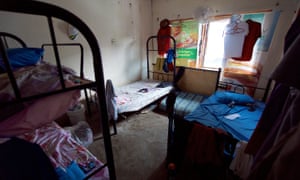*
There is always the option to directly employ workers, so the using of
workers supplied by labour suppliers('contractors for labour') is just a
means to avoid employer obligations...When worker abuses is highlighted
- so easy to simply turn around and say...' we did do it, it was the
'suppliers'..? The use of these workers supplied by labour suppliers is a
PRECARIOUS EMPLOYMENT PRACTICE. It also results in DISCRIMINATION at
the workplace - workers doing the same work end up with different wages
and rights. It also weakens Trade Unions and can be said a 'union
busting' practice. These 'supplied workers' working under the
supervision of the workplace owners are not considered 'employees' of
the workplace - rather employees of the 'labour suppliers', as such
would not be able to enjoy even the benefits of Collective Bargaining
Agreements which will only benefit employees of the workplace...
Samsung and Panasonic accused over supply chain labour abuses in Malaysia
Migrant workers making goods for the global electronics brands claim they are trapped and exploited in Malaysia
Samsung and Panasonic,
two of the world’s leading electronics brands, are facing allegations
that workers in their supply chains are being duped, exploited and
underpaid in Malaysia.
The two companies have launched investigations into allegations of abuse made by Nepalese workers after a Guardian investigation raised multiple concerns about their treatment.
The men said they had been deceived about pay, had their passports confiscated and had been told that they must pay large fines if they wanted to return to Nepal before the end of their contract. They also claimed they were forced to work for up to 14 hours on their feet without adequate rest, and with restricted toilet breaks, in an attempt to settle recruitment fees of up to £1,000 – they said they had to pay this money to secure their jobs.
They said they felt “cheated” and trapped in their factory jobs making or assembling components for household electrical goods sold on the global market.
The two companies have launched investigations into allegations of abuse made by Nepalese workers after a Guardian investigation raised multiple concerns about their treatment.
The men said they had been deceived about pay, had their passports confiscated and had been told that they must pay large fines if they wanted to return to Nepal before the end of their contract. They also claimed they were forced to work for up to 14 hours on their feet without adequate rest, and with restricted toilet breaks, in an attempt to settle recruitment fees of up to £1,000 – they said they had to pay this money to secure their jobs.
They said they felt “cheated” and trapped in their factory jobs making or assembling components for household electrical goods sold on the global market.
“My heart is aching,” said one young man who works in a factory making Samsung microwaves. “I was not given the job I was promised. I am doing very difficult work. I haven’t got the salary they said I would get.”
The Guardian spoke to 30 Nepalese migrants making products for Samsung and Panasonic. Some of those working for Samsung are employed directly by the company, but the majority are hired through a labour supply company. The workers assembling or making parts for Panasonic are employed by subcontracting companies.
Both Panasonic and Samsung forbid their suppliers from confiscating passports or charging migrant workers recruitment fees. Yet all the men interviewed by the Guardian claimed they paid up to £1,000 to recruitment agents in Nepal to secure their jobs in Malaysia. They all also claimed that their passports were confiscated on arrival in the country, illegal under Malaysian employment law.
Workers said this restricts their freedom of movement and leaves them open to detention by the authorities.
Without their passports, the workers said they couldn’t freely leave their jobs and return home without paying fines equivalent to three or four months’ basic salary.
Both Samsung and Panasonic have said they are opening investigations into the conduct of their suppliers following the claims.
The use of labour supply companies and subcontractors is common practice for foreign firms making goods for export in Malaysia but is a system ripe for abuse, according to labour rights groups in the country.
Workers making Samsung products said they were threatened by supervisors at their labour supply company when they said they were unhappy with their work and wanted to return home. “They told us, ‘If you don’t work, or leave without paying, we’ll bury you in Malaysia,’” said one man.
Workers for the labour supply company used by Samsung also claimed they were deceived about the nature and conditions of their work. They said they had been forced to pay illegal fees by recruitment agents used by their labour supply company hours before they departed for their new jobs. Some said the salary they were promised in Nepal was higher than the pay they were now receiving in Malaysia.
“I wouldn’t have come here if I had known the real conditions and salary. I was manipulated,” said one man.
“[The labour supply company in Nepal] are using the name of Samsung to cheat people,” said another worker. “We have been cheated, but we don’t want others to be cheated.”
Other Nepalese workers said they paid between 90,000-115,000 rupees (£685-£875) to a labour recruitment agency in Kathmandu used by Samsung, despite a 2015 cap on recruitment fees set at 10,000 rupees (£75) by the Nepalese government in 2015.
“I paid 115,000 rupees, but the agent only gave me a receipt for 10,000 rupees. He told me that if I was stopped at the airport I should say that that is all I paid,” said one man working at Samsung’s microwave plant. “I knew the agent was cheating me, but what could I do?”
A spokesperson from Samsung said: “As a committed member of the
Electronics Industry Citizenship Coalition (EICC), we comply fully with
the EICC’s Code of Conduct and have found no evidence of violations in
the hiring process of migrant workers hired directly by our
manufacturing facility in Malaysia.
Once there is any complaint, we take
swift actions to investigate.
“We are currently conducting on-site investigations of labour supply companies we work with in Malaysia and the migrant employees hired by these companies. If any violations are uncovered, we will make immediate corrective actions and moving forward we will suspend our business with companies that are found to be in violation.”
In a factory in the capital, exhausted workers making parts for Panasonic spoke of having to work week after week of 14-hour shifts to try to repay the money they gave to recruitment agents in Nepal. Some said they were still far off paying their debts 15 months after arriving in Malaysia. Others claimed they had been told by their companies they must pay the equivalent of three months’ wages if they left before the end of their contract.
“If I could find a way to go back, I’d leave right now but I am trapped by my debts,” said one Nepalese worker, who makes parts for Panasonic. “95% of workers here would do the same.”
Workers assembling Panasonic products in the southern city of Johor Bahru said that they sometimes only received 700 ringgit (£133) a month – half of what they were promised – after production slowed due to a lack of orders.
“We know our earnings are below minimum wage, but what can we do about it?” said one of the workers.
“We feel terrible because we have a big loan to pay back. You have to work for three years just to pay it off.”
Life beyond the assembly line is difficult too. In accommodation visited by the Guardian, workers were living in a grim hostel in an industrial area in Johor with 14 men crammed into one mouldy room. They all shared one broken toilet and two shower cubicles, which opened directly on to a cooking area with a single gas cooker.
In an emailed statement, Panasonic said, “Panasonic will conduct a full investigation into the claims made by the Guardian. We are taking these allegations very seriously and if, in fact, we discover that one of our suppliers has violated such laws or regulations, we will ensure and require them to take necessary corrective action immediately.
“We expect all of our suppliers to strictly comply with our CSR [Corporate Social Responsibility] policy and declaration. These expectations are outlined in Panasonic’s contracted terms and conditions with each supplier. We do not tolerate breaches of these terms.”
The workers interviewed by the Guardian also complained about conditions inside the factories.
“The work is extremely difficult,” said one worker at a Samsung electronics plant making microwave ovens.
“You get only 45 minutes in a 12-hour shift to eat, and seven minutes every two hours to drink water.”
Other workers making parts and assembling products for Panasonic said that they stood all day without decent breaks. One worker claimed they were only allowed to stop work to go to the toilet twice in a 12-hour shift.
The electronics sector in Malaysia, which accounts for nearly 35% of the country’s export economy, has faced international scrutiny for its treatment of migrant workers. In 2014 a report by supply chain watchdog Verité found that nearly one third of workers in Malaysia’s electronics sector are in forced labour, and called for wide reforms of the policies of foreign companies operating there.
“Brands working in Malaysia have to recognise that the standard operating procedure for labour contractors is debt bondage and this has ramifications,” said Phil Robertson, deputy director of Human Rights Watch in Asia.
“Taking someone from Nepal and putting them in a factory in Malaysia costs money, and if these costs are not being factored into the price of a phone, or a microwave or a speaker, then they are complicit in a system that expects the workers to suffer as a result.” - The Guardian, 21/11/2016
Related:-
FORCED LABOR IN THE PRODUCTION OF ELECTRONIC GOODS IN MALAYSIAA Comprehensive Study of Scope and Characteristics







